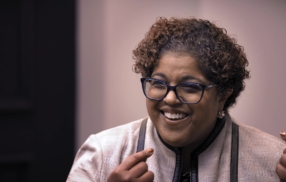
Roshni Raveendhran Explores the Psychology of Technology
By Tom van der Voort
One might assume Darden’s resident faculty expert on artificial intelligence is fascinated by technology. It turns out that what Professor Roshni Raveendhran really wants to understand is people.
As a psychology major at the University of Texas at Arlington, Raveendhran found herself exploring “how people interact with their environment — and what the implications are for their relationships with other people,” she says. A natural next step was to explore one specific environment: the workplace, where so many spend most of their waking hours and develop many critical relationships.
As Raveendhran pursued her Ph.D. in business administration at the University of Southern California, revolutionary advances in technology and artificial intelligence put devices at the center of human culture. But she didn’t ask the usual question: how do people use their smart phone or smart watch? Instead, she looked at the relationship.
“We take our technologies seriously because we want to learn about ourselves and understand how we behave. But what if a human being told you that you’d been sitting for four hours and needed to move around? The experience would be different. People experience feedback from technology as informational rather than evaluative, and I wanted to understand the specific psychological dimensions to the human-technology relationship. What made the technology appealing to you and what kinds of interactions do you have with it?”
Raveendhran brings more than a human-centric view of technology to Darden. She describes herself as sitting at the “confluence of two countries and two cultures.” Born in India, where most of her family still lives, she cherishes her Tamil roots and speaks the language, one of the world’s oldest and an important unifying force for the Tamil people, at home. “I see language as a channel for holding on to culture,” she says. And she’s a massive cricket fan.
But her U.S. roots are equally deep. “I went to school here, I grew up here and my whole adult life has been spent here. I am deeply intertwined in this culture.” For Raveendhran, her husband and her two-year-old son, home is where all these strands are woven together. “We try to have a little bit of both.”
The human dimension also played a critical role in bringing her to Charlottesville.
“When I was on the job market after getting my Ph.D., my first ever job talk was actually at Darden. And I was blown away by the community, the culture and just how welcoming everybody was. So when I started considering offers, I couldn’t stop thinking about how incredible this place was. It became the obvious choice. I never thought I’d end up on the East Coast, in someplace that wasn’t warm year-round, but the student-centric nature of Darden was something I couldn’t say ‘no’ to.”
Collaboration with fellow members of the faculty, particularly Professor Tami Kim, led Raveendhran to advance her research into another area: “I still focus on humans and technology, particularly artificial intelligence, but I’m also looking at AI as an intermediary in relationships between people,” a topic that could scarcely be more relevant since the massive upheaval of the COVID-19 pandemic, which dramatically expanded technology’s role in nearly every aspect of work.
“It’s important for us as a society to think about how to leverage all these technological tools to empower our people to provide their best work and bring their full self to work — whatever that looks like.” Working from home, instead of the office, for instance, has brought Zoom and other technological tools to the forefront of organizational culture. But oftentimes there are not established norms for their use, and technologies can have costs that organizations do not recognize. To understand these, “you have to look at the psychology of the people using the tool,” Raveendhran says.
With instant message options, such as chats in Microsoft Teams or Slack, Raveendhran and Kim found several benefits: speed and an informality that was efficient and built trust, for instance. But there was a cost, too: Psychologically, most people feel obliged to respond in real time, a far different burden than people experience with email. “That puts a lot of pressure on people; they feel like they’re on all the time.”
“We found that when organizations say, ‘If you get a chat after hours, you are not obliged to respond,’ it helps set a new norm” that reduces the cost of using the tool. Looked at through this lens, debates about whether it’s “better” to work from the office or home are misleading; a bit like asking whether a saw or a hammer is a “better” tool.
Naturally, the answer would depend on what you are trying to accomplish, and the costs and benefits of each choice. Nonetheless, Raveendhran sees discussions about whether to go back to old ways of working as little more than tilting at windmills. “It’s not really up for debate. The world has changed, whether we admit it or not.”
“During the pandemic, we discovered that people actually worked a lot more hours, and companies were very productive. People realized that they wanted to work on their terms, and that they could be very productive on their terms. Exploring that in a meaningful way instead of pushing the issue aside is going to be critical for organizations.” Those that think carefully and purposefully about technologies are poised to raise the benefits and lower the costs of using them.
Norms are powerful tools, says Raveendhran, but only if they account for how human beings really think and act.
The University of Virginia Darden School of Business prepares responsible global leaders through unparalleled transformational learning experiences. Darden’s graduate degree programs (MBA, MSBA and Ph.D.) and Executive Education & Lifelong Learning programs offered by the Darden School Foundation set the stage for a lifetime of career advancement and impact. Darden’s top-ranked faculty, renowned for teaching excellence, inspires and shapes modern business leadership worldwide through research, thought leadership and business publishing. Darden has Grounds in Charlottesville, Virginia, and the Washington, D.C., area and a global community that includes 18,000 alumni in 90 countries. Darden was established in 1955 at the University of Virginia, a top public university founded by Thomas Jefferson in 1819 in Charlottesville, Virginia.
Press Contact
Molly Mitchell
Senior Associate Director, Editorial and Media Relations
Darden School of Business
University of Virginia
MitchellM@darden.virginia.edu




